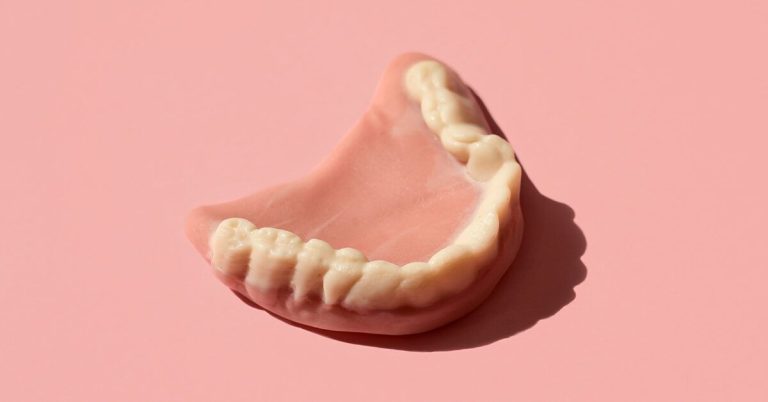Partial or full dentures (removable teeth) can replace missing teeth, improving the appearance of your smile.
These false teeth are designed to look natural and are made from different materials such as acrylic and metal.
Even though your dentures are fake, it is important to clean them regularly.
However, cleaning dentures involves more than brushing. Other steps are needed to keep them in good condition and maintain your oral health.
Keep reading to learn how to better clean and maintain your dentures.
Plaque and food stick to dentures in the same way they stick to natural teeth. Dental plaque is a sticky film of bacteria that forms on dentures and teeth after eating and drinking.
If you don’t clean your dentures, plaque can build up, putting you at risk for gum disease and bad breath.
Regular cleanings are vital to your overall oral health. To keep your dentures clean, you’ll need the following:
- a toothbrush with soft bristles
- water
- denture cleaning solution or mild soap
- a soft towel
Plan to brush your dentures at least once a day. Brushing them twice a day, every morning and every night is even better. But don’t use toothpaste when you brush your dentures.
Many brands of toothpaste contain ingredients that are too abrasive for removable teeth. These toothpastes can gradually damage the surface of the denture, leaving scratches or small cracks.
Instead, brush your dentures with a soft-bristled toothbrush designed specifically for dentures. These toothbrushes can prevent scratches on the surface of your dentures.
Although brushing is important, brushing alone does not clean dentures. To maintain dentures in the long term, you must clean them thoroughly every night after removal.
Dentists recommend that you clean your dentures at least once a day. It is even better to brush your dentures twice a day.
It is a good idea to brush your dentures when you wake up in the morning and before you go to bed at night. You should also soak them in a mild soap or dental cleaning solution every night.
Although you shouldn’t use toothpaste when brushing your dentures, you must use toothpaste to brush your gums and tongue twice a day. This keeps your gums healthy and helps prevent bad breath.
If you have partial dentures, remember to brush and floss your remaining teeth daily.
Rinsing the mouth with mouthwash also contributes to oral health. You can remove the dentures before using mouthwash or use a mouthwash designed for denture wearers.
Properly cared for dentures can last an average of 7 to 10 years. Here are some tips to extend the life of your dentures.
Regular dental appointments are an essential part of your oral health. If you have dentures, continue to schedule regular checkups with your dentist every 6 months.
Also, contact your dentist if you have any concerns about your dentures.
Make an appointment if your dentures:
- I feel awkward
- slip or no longer fit properly
- you make noise when you talk or eat
- look visibly worn or broken
You should also contact your dentist if you develop:
- mouth sores
- bloody gums
- bad breath
If you develop mouth sores, this may mean that your dentures no longer fit properly.
Dentures can improve your smile and boost your confidence. But it is important to take care of them properly.
Consistent cleaning not only extends the life of your dentures, but also helps maintain your oral health.
Be sure to clean and soak your dentures daily with the right materials and call your dentist if you have any complications.

